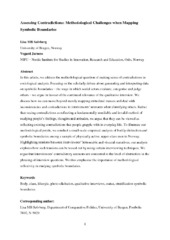Assessing Contradictions: Methodological Challenges when Mapping Symbolic Boundaries
Peer reviewed, Journal article
Accepted version
Permanent lenke
https://hdl.handle.net/1956/22562Utgivelsesdato
2019Metadata
Vis full innførselSamlinger
Originalversjon
https://doi.org/10.1177/1749975518819907Sammendrag
In this article, we address the methodological question of making sense of contradictions in sociological analysis. Focusing on the scholarly debate about generating and interpreting data on symbolic boundaries – the ways in which social actors evaluate, categorise and judge others – we argue in favour of the continued relevance of the qualitative interview. We discuss how we can move beyond merely mapping attitudinal stances and deal with inconsistencies and contradictions in interviewees’ accounts when classifying others. Rather than seeing contradictions as reflecting a fundamentally unreliable and invalid method of studying people’s feelings, thoughts and attitudes, we argue that they can be viewed as reflecting existing contradictions that people grapple with in everyday life. To illustrate our methodological points, we conduct a small-scale empirical analysis of bodily distinction and symbolic boundaries among a sample of physically active, upper-class men in Norway. Highlighting tensions between interviewees’ honourable and visceral narratives, our analysis explores how such tensions can be teased out by using certain interviewing techniques. We argue that interviewees’ contradictory accounts are connected to the level of abstraction in the phrasing of interview questions. We thus emphasise the importance of methodological reflexivity in studying symbolic boundaries.
